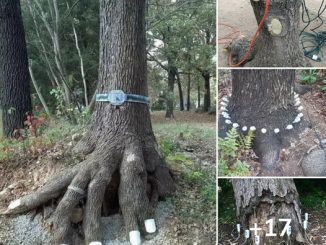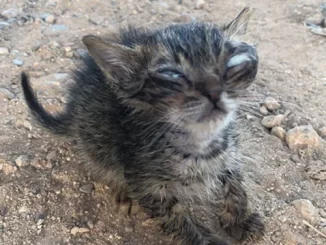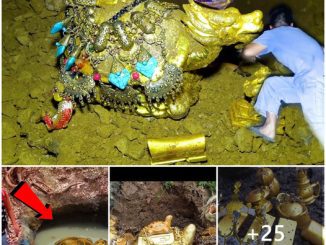In a surprising discovery, a man from Kentucky unearthed a collection of more than 700 rare gold coins buried on his farm, now known as the ‘Great Kentucky Hoard.’ The unidentified individual recorded himself uncovering the treasure, which consists of coins minted between 1840 and 1863. Overwhelmed with excitement, he exclaimed, “This is the most incredible thing ever.”
Among the coins found is an 1863 $20 Gold Liberty piece, which experts estimate could fetch up to six figures at auction, according to GovMint. The collection includes a total of 18 of these ultra-rare coins.

This could potentially mean a big payday of $1.8 million if each of the coins is worth at least $100,000. And we can’t forget about the many other rare coins in the collection. Experts believe that this “treasure” once belonged to wealthy Kentuckians in the 1860s who buried large amounts of money to keep it safe from Confederate raids during the American Civil War.

One of the coins in the collection is a 1863 $20 Gold Liberty, which is shown in the picture. Typically, this coin is valued at a six-figure sum when sold at auction.

An unknown man recorded himself uncovering a collection of treasures dating back to the years between 1840 and 1863, expressing his excitement by saying, “This is the most incredible thing ever.” The coins were recently authenticated by the Numismatic Guaranty Corporation (NGC), who determined that they were in extremely fine to mint condition. The exact location of the discovery remains unclear, but it is said to belong to the man who unearthed them. The hoard consists mostly of gold dollars, including $1 Gold Indians, $10 Gold Liberties, and $20 Gold Liberties.

During the Civil War, many people hoarded their money due to the presence of outlaws, bootleggers, and gangsters, resulting in the disappearance of a large amount of coins from circulation as households buried their money. Kentucky, being located on the border between the North and South and declared neutral by the state government, was particularly vulnerable to this phenomenon. US coin expert Jeff Garrett, editor of The Official Redbook: A Guide Book of United States Coins, described the opportunity to handle the “Great Kentucky Hoard” as one of the highlights of his career.

The significance of this discovery cannot be emphasized enough. While finding one mint condition 1863 double eagle would be a significant numismatic event, discovering nearly a roll of superb examples is truly remarkable. According to Ryan McNutt, an archaeologist specializing in conflicts at Georgia Southern University, many Americans affected by the Civil War became skilled at hiding goods and valuables.
Ian Russell, the president of the California-based coin auction house GreatCollections, has identified the coins most likely to command high prices. Russell, who is also a coin expert, shared his advice on identifying valuable rare coins with Dailymail.com, emphasizing that any coin with a double die is automatically considered rare.
A double die, made famous after the 1955 issue, is a coin that displays a double image on part or all of its design. This anomaly occurs when a coin is not manufactured correctly, resulting in an accidental duplication of imagery.

In general, coins with missing elements or extra details can bring in the highest values. Russell mentioned that his auction house caters to a range of clients – from experienced coin collectors to novices who stumble upon pieces in their homes and assume they aren’t worth much. He also noted that the number of female collectors has increased during the pandemic.
“The coin collecting community used to be predominantly male,” Russell stated. “But since Covid, we’ve seen many husbands getting their wives involved. I think it’s because they were spending more time at home together. Now women make up about 5 to 6 percent of the community, which, although still relatively low, is a significant increase from before.”


